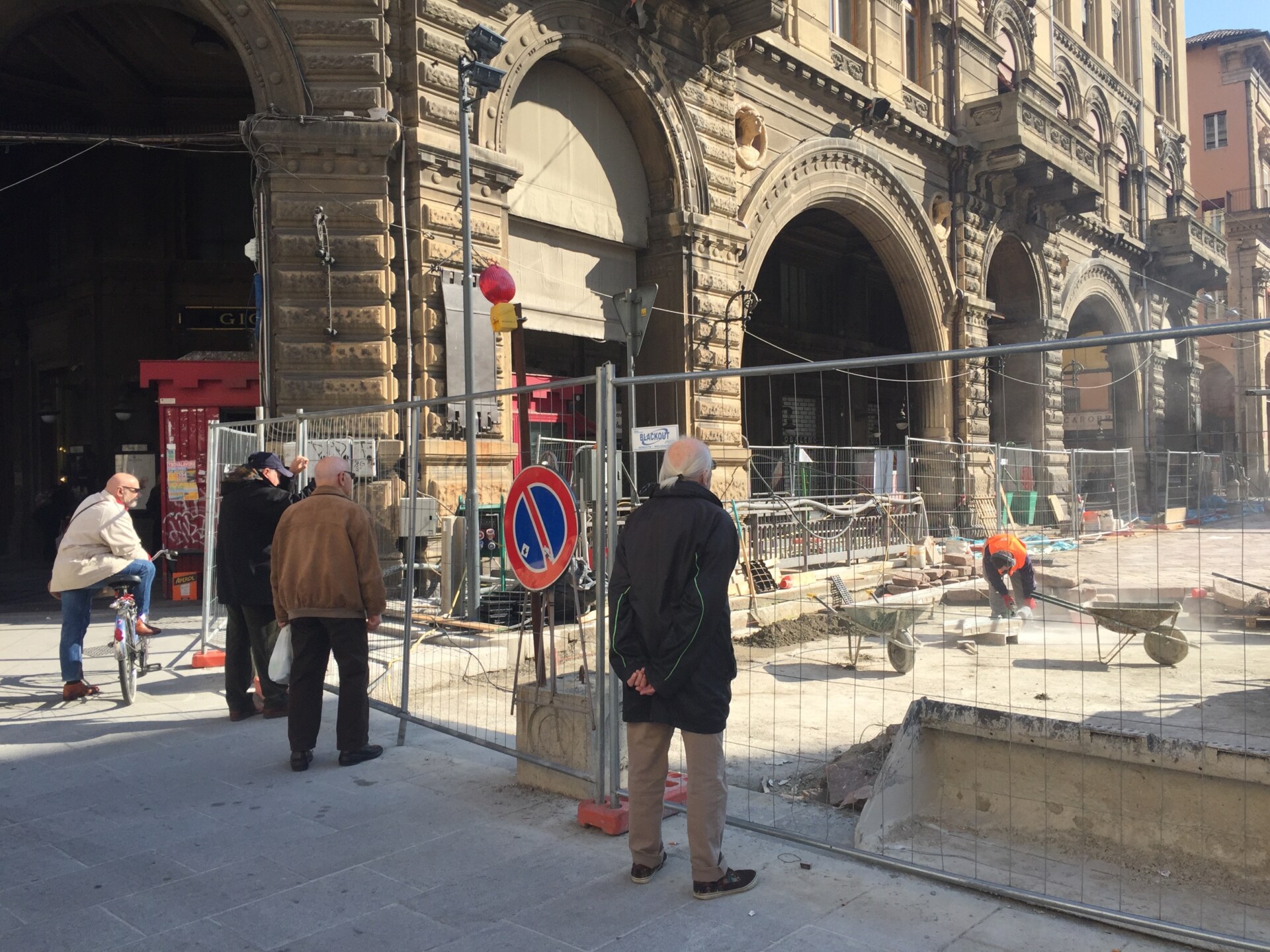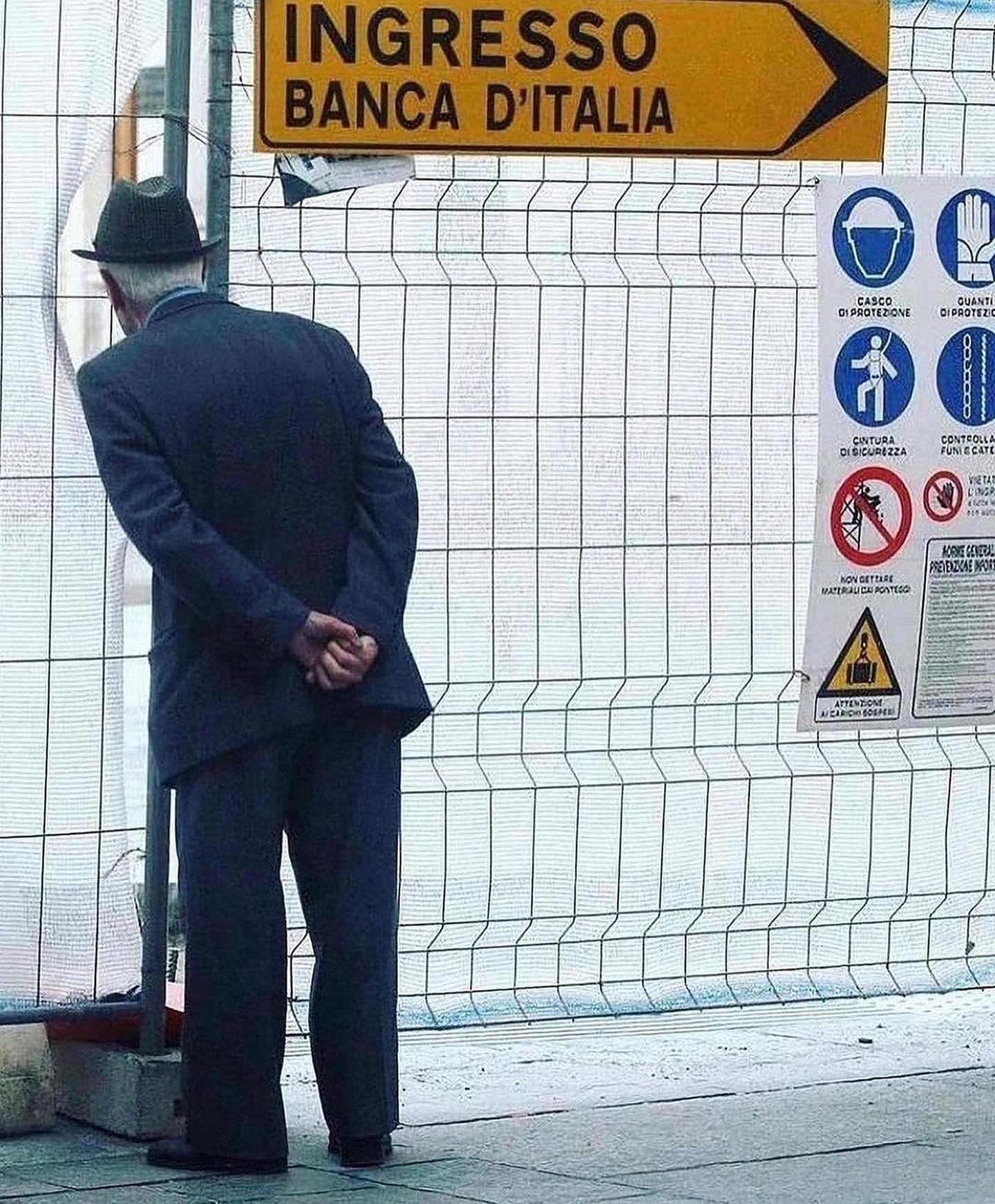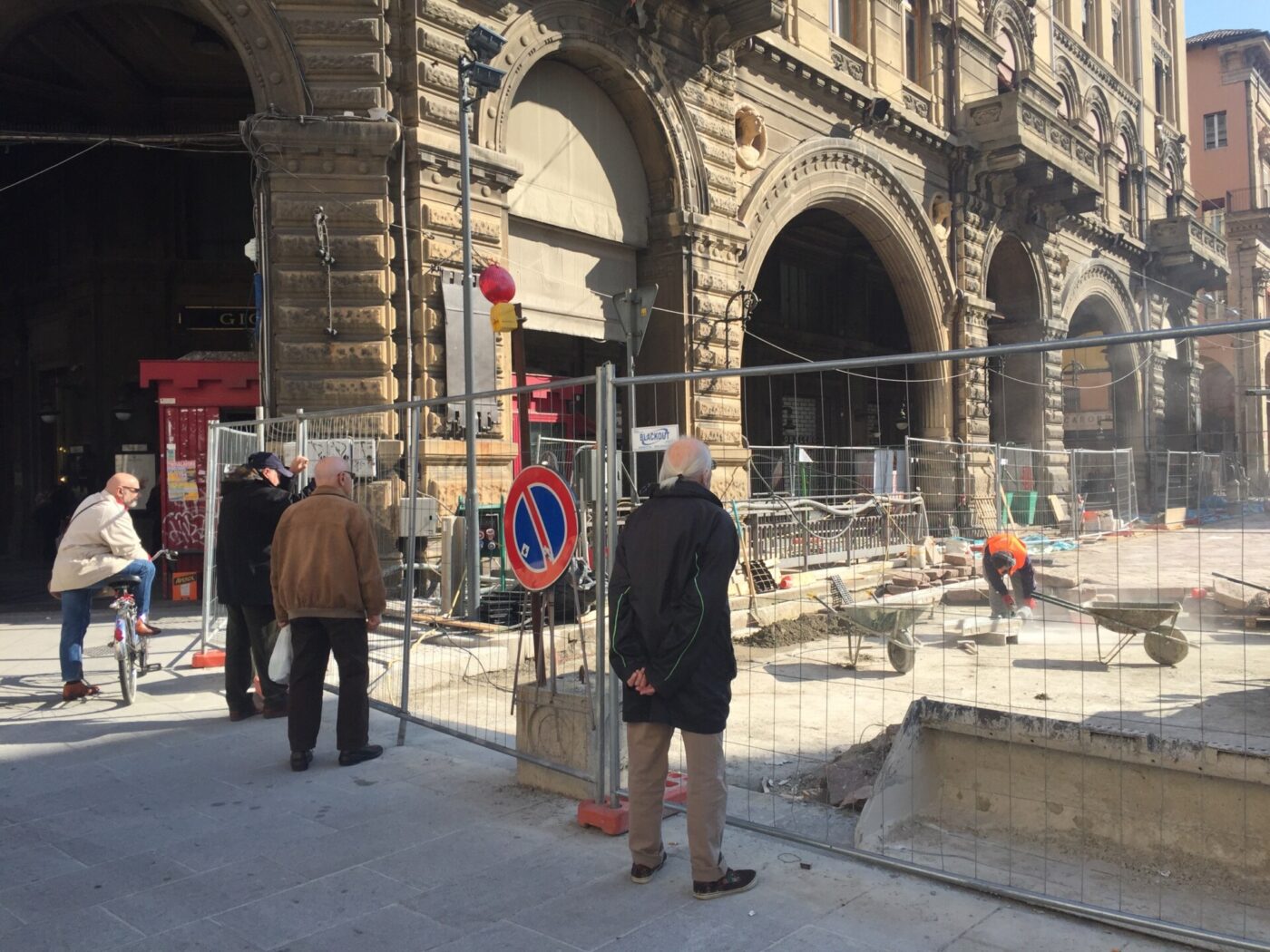It’s Friday afternoon and Bologna is in full swing. Students and workers populate tables peppered around the piazze, and an artist down a side street starts painting the walls while another stands outside a bookshop promoting his new comic strip, humorous variations of the hammer and sickle with captions like “compagni sporcaccioni” (dirty comrades) and “compagni confusi” (confused comrades). Elsewhere, a young boy plays piano outside San Petronio’s half-n-half façade, and a freshly-pasted poster advises “if something you recognise as being wrong is not being changed, you have to be the one to change it.” It’s the kind of principled slogan that conjures images of young, blue-haired activists, but here in sprightly Emilia-Romagna, there’s another unlikely sect of the population who share its socially-conscious sentiment. And while the city is gearing up for the weekend, they are gearing down, standing still, and zooming-in, probably around their nearest cantieri (building sites).
I’m talking about Umarell, Italy’s passionate pensioners with a penchant for all things construction. You can usually find them encircling the city’s urban works-in-progress like moths to a crane. Though unlike moths–and cheesy puns, for that matter–the only holes they leave behind are in the construction hoarding that prevents them from peeking on progress. The reasons for doing so are varied: out of duty to their communities, nostalgia for their own working lives, to reclaim a sense of agency, or simply out of boredom. For many Bolognesi, the Umarell’s presence is endearing in its familiarity: permanent fixtures of the cityscape with their beige overcoats, flat caps, and signature stance–two hands clasped behind the back and an inquisitive forward tilt that lets others know they mean business. Their daily itinerary includes observing, checking, questioning, suggesting, and sure, offering the occasional bit of unsolicited advice. A small price to pay, one may argue, for enduring beauty. I due torri? I portici? I’m no historian, but I’d be willing to bet there was an Umarell in orbit at the time of construction.

Despite these speculative contributions to architecture, Umarell have spent their lives largely unnoticed–not quite as glamorous as their Milanese counterparts, sciure, nor as celebrated as the country’s archetypical, apron-clad nonne. But that all changed in 2005, when journalist Danilo Masotti coined the term “Umarell” (a derivative of the Bologenese dialect’s omarello or ‘‘little man”) and catapulted them into the spotlight. Masotti’s one-man project documenting the city’s Umarell online morphed into a nation-wide obsession. “When I first discussed the phenomenon on my blog, I was inundated with replies from people saying, ‘I know one!’, and I received pictures of men lined up to study roadworks,” Masotti told The Times.
Before long, construction workers began to put notices up (addressed always “to the Umarell”) to inform of their next project, and calendars devoted to the city’s sidewalk supervisors began cropping up online. Next came the books, board game, apps, action figures (or, perhaps more fittingly, inaction figures). Thanks to Masotti, the Umarell had become such a beloved figure that in 2017, Bologna allowed the renaming of a suburban square, Piazza degli Umarell, while Burger King recruited five of their own to star as the unlikely heroes of a TV ad campaign.
Likewise, in San Lazzaro di Savena, resident Franco Bonini became the first “Umarell of the year”, not to mention the town’s most famous citizen with a guest spot on the Miss Italia pageant. “My friends couldn’t wait to retire and rest, but not me,” he told Masotti, “I was glad to have more time to devote to building sites.” And though fame and fortune may threaten to lure those of a more vainglorious nature into the Umarell fold, Masotti assures us: “you don’t become an Umarell, you are born one.”
Speaking at the inauguration of Piazza degli Umarell in 2015, Bologna city councillor Matteo Lepore described Umarell as “people who commit themselves to the common good.” This commitment was put to good use by the nearby city of Riccione, who allocated a budget of €11,000 for Umarell to oversee the city’s cantieri. Here, Umarell were tasked with preventing theft when the site was unattended and verifying the number of trucks that come and go to ensure materials have been dealt with according to receipts. It is, quite literally, an honest day’s work.
Though not everyone appreciates their efforts, with some likening Umarell to the “Karens” of the USA; intrusive, prying and judgmental with a tendency toward an “I-know-best” attitude. And it’s easy to see how their constant presence and unsolicited advice could make construction workers feel frustrated and micro-managed. The word has also become a shorthand for a kind of irksome passivity. In fact, when Matteo Lepore–who previously endorsed the Umarell when he inaugurated their namesake piazza–was interviewed again in 2021, he used the word as the antithesis of “proactive”.
It’s not all construction sites and roadworks, though. You’ll also find them helming the queue at Coop the minute the doors swing open, playing briscola outside the bar, or helping the Sunday drivers among us parallel park with the swift motion of one’s left arm. Public space is the playground of the Umarell–a social site of escape, engagement, and purpose. And the action isn’t all in Bologna, either. The Umarell is everywhere–from Sicily’s sun-baked streets to the mountainous peaks of Bolzano, and beyond–if, that is, you care to notice, which is really the crux of the matter. When the word was added to the Zingarelli dictionary in 2021, you could say Masotti’s mission for Umarell recognition was complete. Italy’s unofficial civic guardians had finally become, well, official.
And while they never really needed a name to validate their pastimes, Masotti’s project is a testament to something uniquely Umarell–namely the power of paying attention. Maybe there is a sense of entitlement underscoring their behaviour. Maybe they just want to get out of the house. Whatever their motives, the unlikely rise of the Umarell demonstrates how benevolent eyes cast upon cities and citizens can hold the potential to transform and empower communities. But don’t take my word for it. “Before, I was anonymous, just checking things out, referring to the council about matters,” said Franco Bonini, the OG “Umarell of the Year”, “Now people come to me and ask ‘why doesn’t this work?’ I say, ‘I don’t know, I’m not the mayor!’”




